Sodium Benzoate & Citric Acid Myth
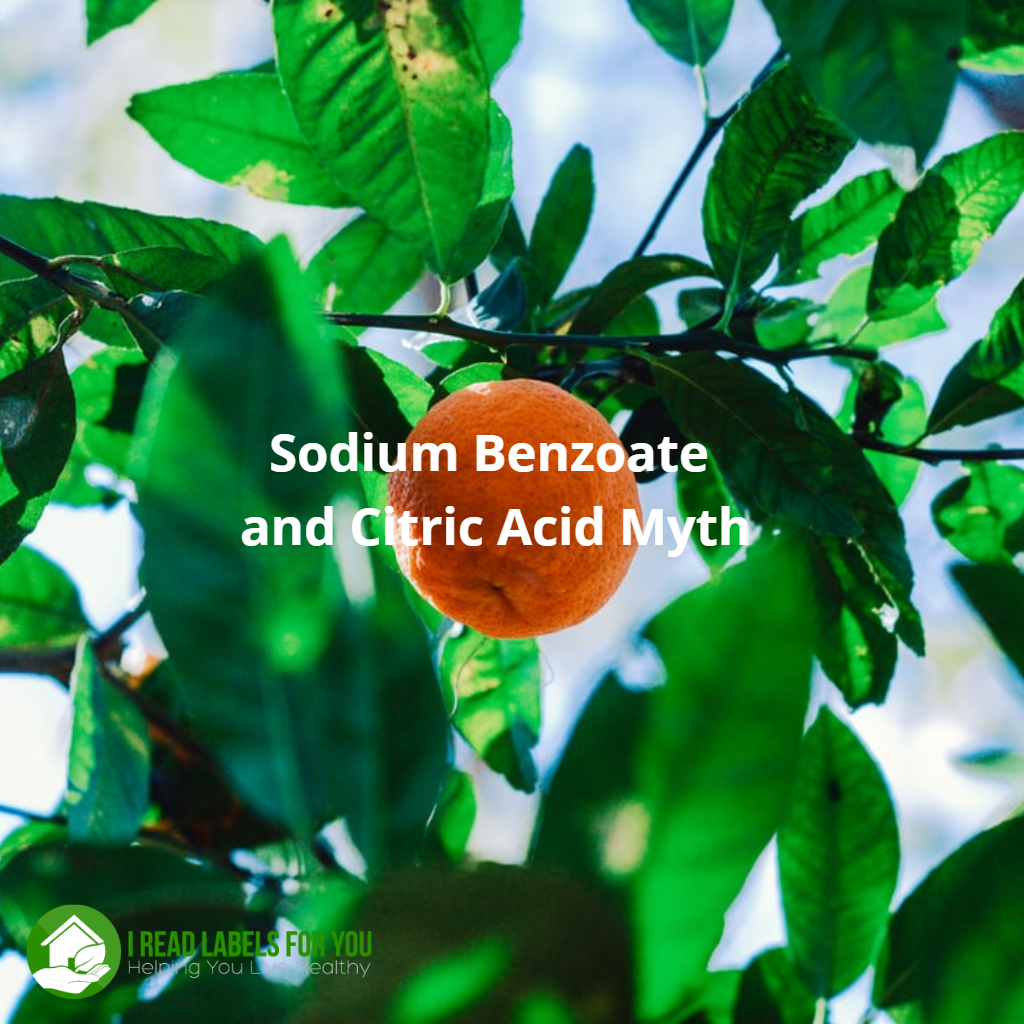
Are you confused about the safety of cosmetic products that contain both sodium benzoate and citric acid? In this special ingredient spotlight review, you will learn whether the sodium benzoate and citric acid combination in products triggers the formation of benzene, classified as a human carcinogen. We will get to the bottom of this concern and filter out myth from real science. To see my opinion about baby wipes that contain both sodium benzoate and citric acid, check out my blog post about Kirkland Signature baby wipes. And to learn about the safety of phenoxyethanol preservative, jump to my blog post about phenoxyethanol in skin care.
In this post:
Can benzene form in soft drinks?
To begin, the sodium benzoate preservative controversy started in 2005 when some soft drinks tested positive for carcinogenic benzene. According to the FDA website, the FDA first became aware that benzene could form in some drinks in the early 1990s.
In November 2005, the FDA examined the results of a survey of benzene levels in soft drinks and discovered the following. Specifically, the vast majority of the drinks sampled (including those with both benzoate salts and ascorbic acid) contained either no detectable benzene or levels well below 5 ppb. This is the EPA’s level for benzene in drinking water. (To put things in perspective, California’s public health goal for benzene is 0.15 ppb. This number is based on scientific research into the long-term health effects of benzene exposure. It does not take into consideration what industry lobbyists might want.)
Apparently, the soft drink survey generated a lot of publicity. As a result, soft drink manufacturers either discontinued the use of sodium benzoate or reformulated those products that had higher benzene levels. The FDA continued testing soft drinks after the initial survey and found that benzene levels were less than 1.5 ppb.
However, there appeared an opinion that the same chemical reaction could occur in cosmetic products. Because citric acid and ascorbic acid are very similar, people voiced their concerns on the Internet. The cause of the worry was the presence of citric acid in the products that contained sodium benzoate.
Does sodium benzoate stimulate the formation of benzene?
Starting with 1993, there have been a lot of studies to determine specific benzene formation mechanisms. Most studies indicate the best candidates for benzene formation. Specifically, they are conditions with elevated temperature and light where ascorbic acid and benzoic acid or potassium or calcium or sodium benzoate preservative are present. In addition, traces of copper and iron may catalyze reactions between ascorbic and benzoic acid or benzoate salts (source).
Further, in 2006, the American Beverage Association published guidelines for beverage manufacturers. These guidelines were to help them to reduce or inhibit the formation of benzene in their products. One of the most important guidelines involved replacing ascorbic acid with another antioxidant. Another one was about adding EDTA or sodium polyphosphates to chelate the metallic ions that catalyze hydroxyl radical formation. The third guideline was to review the storage conditions and shelf life to minimize product exposure to high temperatures and ultraviolet (UV) light.
Interestingly enough, while there is a detailed account of the chemical reaction that forms benzene, there is no mention of citric acid. It is ascorbic acid that is the culprit. So, should we be concerned about ascorbic acid and sodium benzoate preservative reaction in skincare products?
Should I avoid citric acid or ascorbic acid in the combination with sodium benzoate?
To determine whether a product is safe enough to recommend for you to use, I must look at every ingredient. Although the Skin Deep database is a good starting point, it has certain shortcomings for which as consumers we should account. (Find out how to use the Skin Deep database the right way.)
Undoubtedly, the best way to get accurate information about ingredients is to go directly to the source, namely, scientific studies. For instance, the Cosmetic Ingredient Review report on sodium benzoate preservative describes a test to examine benzene formation in the beverage samples. The beverages were in the UV stabilized and non-UV stabilized packaging. Some of the samples had 0.04% benzoate and 0.025% ascorbic acid in water. As a result, under intense UV light, benzene levels increased by as much as 53%, whereas the use of UV stabilized polyethylene terephthalate bottles reduced benzene formation by approximately 13%.
Based on the CIR report, I believe it is a good idea to avoid skin products containing both ascorbic acid and sodium benzoate preservative. Note that the CIR report does not say anything about a reaction between citric acid and sodium benzoate preservative to produce benzene.
Conclusion about citric acid and sodium benzoate preservative
In conclusion, there seems to be no reason to worry about the combination of citric acid and sodium benzoate preservative in a personal care product. The concern related to the formation of carcinogenic benzene arises only when ascorbic acid and benzoic acid or benzoate salts interact with one another.
It is such a relief to know this because most personal care and skincare products contain citric acid. For example, my survey of popular baby wipes brands showed that every baby wipe formulation had citric acid in it. Citric acid regulates the pH of a product, and its quantity is usually very small. Also, sodium benzoate preservative is common in baby wipes to protect them from bacteria contamination.
Visit my blog post about Kirkland Signature baby wipes that contain both sodium benzoate and citric acid to see what I think about them. And check out the IRLFY shop with multiple options of healthy skincare, personal care, household, and baby products.
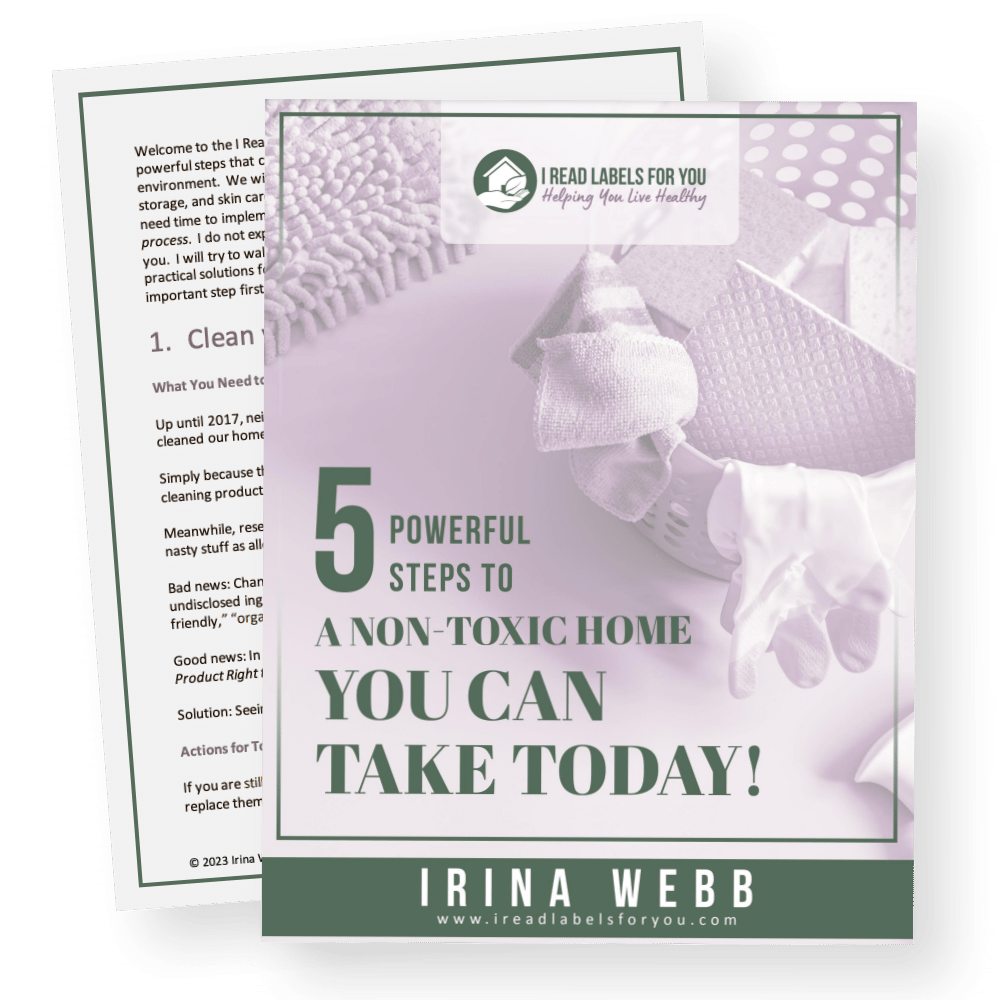
Download The Free Guide!
5 Powerful Steps To A Non-Toxic Home
Join our informed consumer community and get our free guide the “5 Powerful Steps To A Non-Toxic Home”.

 Written by
Written by 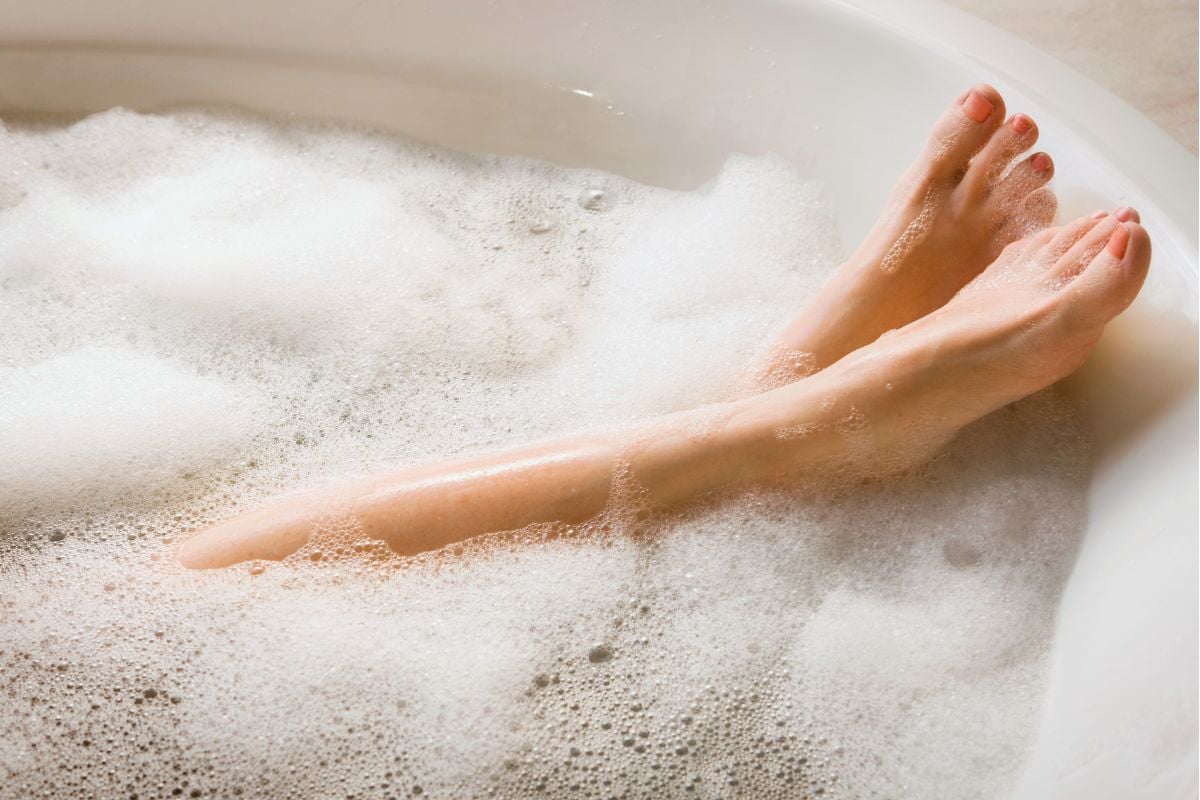
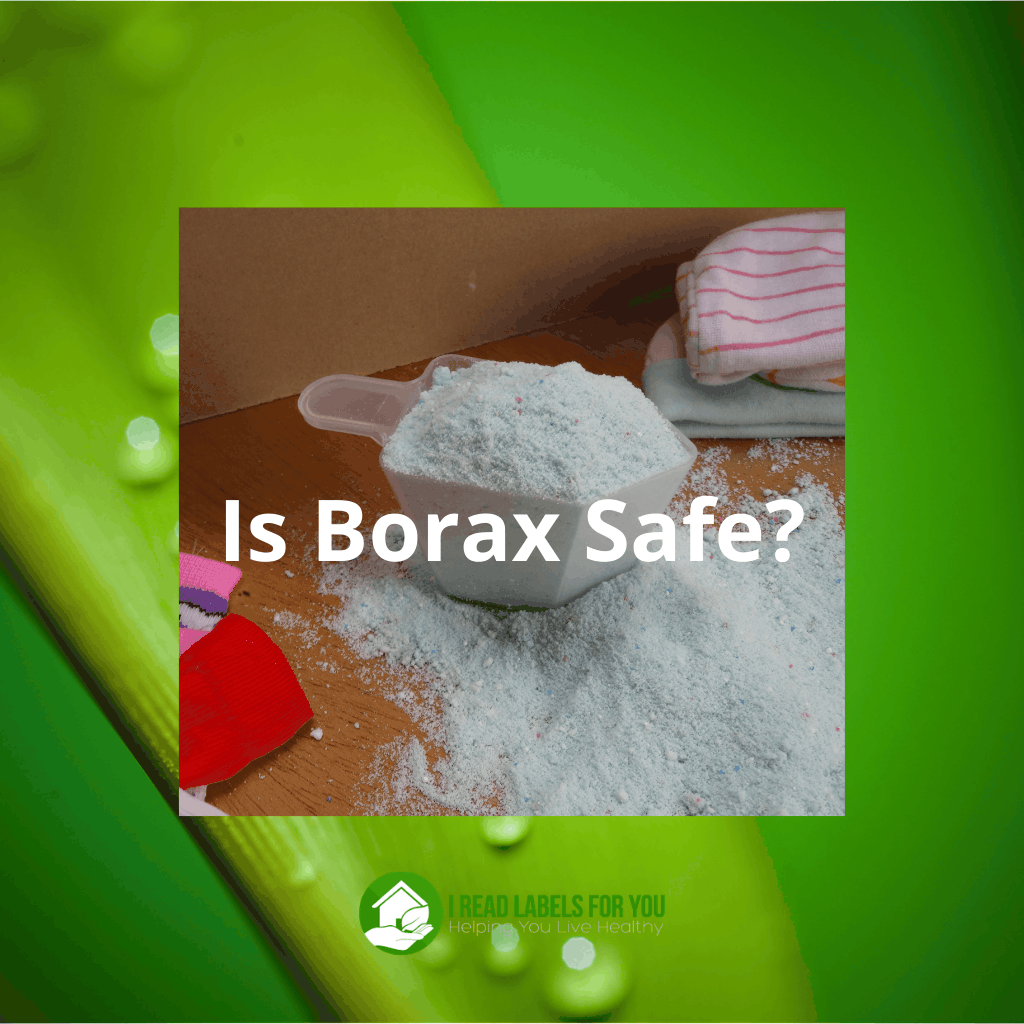

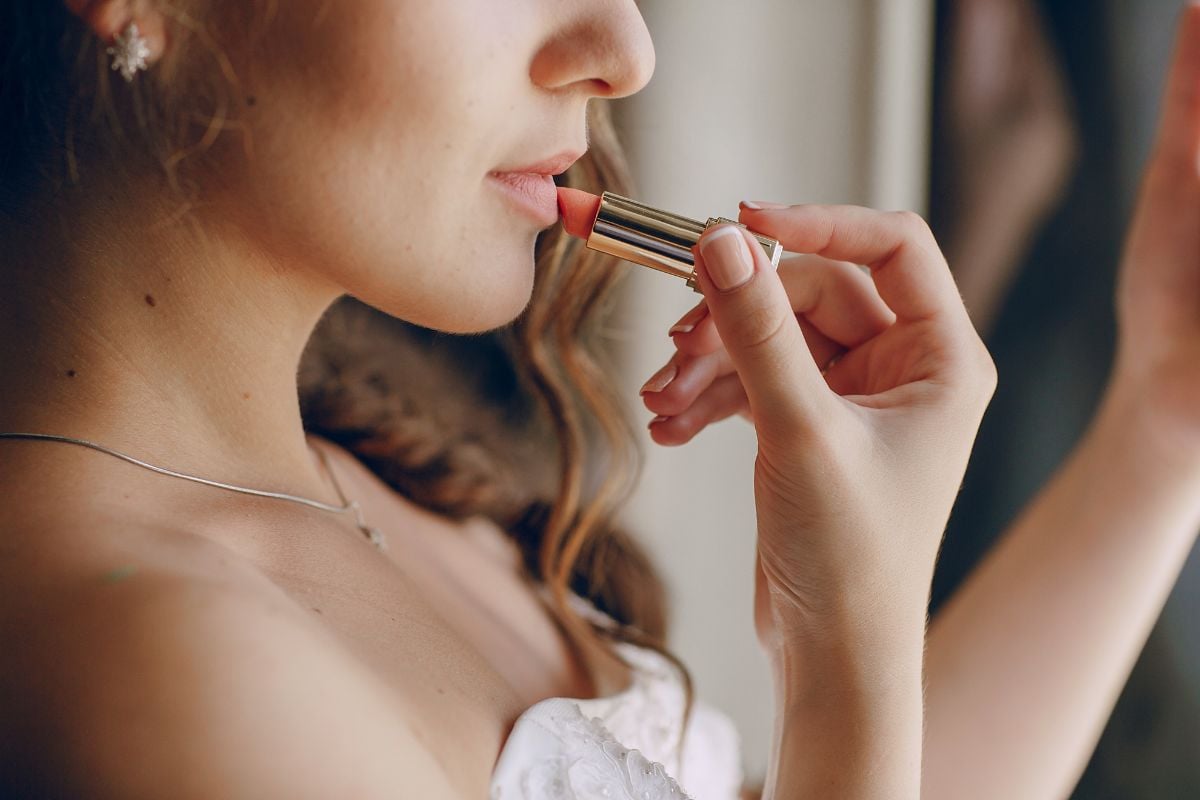


Water, Glycerin, Cocamidopropyl Betaine, Sodium Methyl Lauroyl Taurate, Glycol Distearate, Sclerotium Gum, Sodium Benzoate, Cocamide MEA, Citric Acid, Lauric Acid, Sodium Methyl Aurate, Guar Hydroxypropyltrimonium Chloride, Sodium Hyaluronate, Stearic Acid, Panthenol, Sodium Cocoyl Alaninate, Cetrimonium Chloride, Sodium Hydroxide
this is the ingredients list of my face wash
it’s safe please reply
Hi Abhi! Regarding your question about the safety of your face wash, we realize that it’s not easy to read and understand the ingredients. For this reason, we kindly offer a service called “product ingredient review” to help you understand the safety of your product. Please, follow the link to use the service: https://ireadlabelsforyou.com/services/ingredient-review/
Just found you blog, I found a produte Gooya marinade has sodium benzoate and edta with citric essence oils. My search has found nothing about these two together with citric acids. Along benzoate and citric asics are not good. Put with Edta? Edta is a good metal tetox and more. Bensese/ carcinogen/ be efected in a good way with edta?
Hi Carolinah! Our post is not about sodium benzoate and citric acid. It is about sodium benzoate and vitamin C combination. Citric acid is not vitamin C.
I am breastfeeding and very careful about what I put on and in my body. The one treat I allowed myself (with doctor’s OK) is an almost daily latte. I just discovered this place uses Torani vanilla syrup which has sodium benzoate and citric acid. I am panicking that I’ve inadvertently harmed my baby by drinking this regularly…
Hi, Ali! Our “Sodium Benzoate & Citric Acid Myth” blog post emphasizes in the introduction and conclusion that “Benzene may form only when sodium benzoate and ascorbic acid are present in the same product. It must be ascorbic acid for this to occur, NOT citric acid.” May we ask about the cause of your anxiety?
Thank you for this! I was afraid to drink my Aloe Vera juice because it contains Sodium Benzoate and Citric Acid. Thanks for clearing everything up!
Thank you for your kind feedback, Kaylee! You are very welcome!
Hello Irina!
I was so interested to read this article as I have been studying Sodium Benzoate and how it interacts with Ascorbic Acid for some time now. I’m a skincare enthusiast and I’ve been obsessed with ingredients for a while. I try my hardest to only use the purest products (no parabens, alcohols, overall harsh ingredients etc.) Thus, once I learned how the two ingredients (in the same formulation) could cause Benzene, I was FLOORED and I instantly put it on my list of bad ingredients (based on individualized situation), mainly because I use A LOT of Vitamin C (in the form of ascorbic acid) products daily. After doing some research I learned that not only do A TON of products contain Sodium Benzoate, but also ingredients like: Benzoic Acid and a number of other “Ben” ingredients (many having a Benzene ring in their core or makeup). I was overwhelmed by how many products I had to eliminate and even more alarmed by a few VITAMIN C products that had the both ingredients inside. All that being said, I would love to hear your thoughts on the following question: In your opinion should I be concerned about using products with Sodium Benzoate in them since I would more than likely follow up with an Ascorbic Acid product? Wouldn’t that be similar to mixing the two ingredients and creating the cocktail on the surface of skin that would be absorbed?
Any advice would be more than appreciated! I’ve been racking my brain over this question for the longest time and constantly eliminating products with Sodium Benzoate in them.
Thank you so very much for your time and assistance!
Hi, Brittany! Thank you for reaching out to I Read Labels for You! Good job with your healthy living journey! As for your question, we have talked to chemists and did research into scientific sources, but we have not found any evidence proving that benzene formation on the skin after the subsequent use of ascorbic acid is possible. We hope this helps!
Hello Maria!
Thank you, thank you, thank you so very much for your kind words and reply! This information definitely helps!!
I TRULY appreciate your time and assistance!!
Sincerely,
Brittany B.
Of course! You are so very welcome!
Hi Irina,
I was wondering, is there a concern for the combination of Ascorbyl Palmitate and Sodium Benzoate in skincare products? I was unable to find any research about this form of Vit C.
Hi, Raza! Thank you for the question! Ascorbyl Palmitate is a kind of Vitamin C, and we do not recommend the combination of Vitamin C with Sodium Benzoate. I hope this helps!
How about the sodium benzoate in novaferrum liquid iron supplements for kids? Pediatricians recommend taking novaferrum with vitamin c foods like oranges for iron absorption. Does the combination result in the formation of carinogenic benzene?
Hi Rajam! We appreciate your interest! Irina will be happy to help you with your question in a private consultation: https://ireadlabelsforyou.com/services/
Ever since the reports of Benzene have been in suncreen, I’ve been on the look out for Sodium Benzoate everywhere!
Lately I’ve been using two Mario Badescu products and I’m a bit nervous they’re unsafe. Typically I use the Witch Hazel Toner, Cellufirm Drops and Vitamin C Serum – and they all have Sodium Benzoate. Although my skin has been looking *great* lately, I DEFINITELY do not want to continue usage if they’re cancer causing.
The product I guess I’m most concerned about is the Vitamin C serum? Here are the ingredients:
Propylene Glycol, Aqua (Water, Eau), Aloe Barbadensis Leaf Juice, Hexylene Glycol, Pentylene Glycol, Tetrahexyldecyl Ascorbate, 3-O-Ethyl Ascorbic Acid, PEG-25 Hydrogenated Castor Oil, PEG-40 Hydrogenated Castor Oil, Cucumis Sativus (Cucumber) Extract, Panax Ginseng Root Extract, Sodium Hyaluronate, Soluble Collagen, Lavandula Angustifolia (Lavender) Oil, Hydroxyacetophenone, Triethanolamine, Citric Acid, Potassium Sorbate, Caprylyl Glycol, Phenoxyethanol, Silver Citrate, Zeolite, Sodium Benzoate
What are your thoughts? Cease and desist?
Hi Emma! The product you mentioned contains ethoxylated ingredients, namely PEG-25 and PEG-40, that we do not recommend on our website. If you need a more detailed consultation, Irina will be happy to help you: https://ireadlabelsforyou.com/services/
Hello. Is it okay to use this face wash that has this ingredients
Ingredients
Aqua (Water)
, Sodium Laureth Sulfate, Glycerin, Cocamidopropyl Betaine, Sodium Chloride, Benzyl Alcohol, Glycol Distearate, PEG-40 Hydrogenated Castor Oil, Laureth-4, Sodium Benzoate, Dipropylene Glycol, Tocopheryl Acetate, PEG-120 Methyl Glucose Dioleate, Sodium Citrate, Propylene Glycol, Citric Acid, Tetrasodium EDTA, Parfum (Fragrance), Retinyl Palmitate, Disodium Phosphate, Hexyl Cinnamal, Hydroxycitronellal, Citronellol, Sorbitol, Sodium Hydroxide, Limonene, Linalool, Cucumis Sativus (Cucumber) Fruit Extract, Denatonium Benzoate, Tocopherol, Benzoic Acid, Ci 19140 (Yellow 5), Ci 42090 (Blue 1)
Hi, Tanzila: this product does not adhere to the safety standards of my blog. For more information, please take advantage of my inexpensive email product review service: https://ireadlabelsforyou.com/pick-brain-product/ ~Irina
For the Mad Hippie Vitamin C
Water Deionized, Vitamin C (Sodium Ascorbyl Phosphate), Alkyl Benzoate, Vegetable Glycerin, Water, Glycerin, Sodium Levulinate, Sodium Anisate, Clary Sage (Salvia Sclarea), Grapefruit (Citrus Grandis), Hyaluronic acid, Amorphophallus Konjac Root Powder, Aloe Barbadensis Leaf, Vitamin E (Tocotrienol), Ferulic acid, Chamomile Flower Extract (Recutita Matricaria), Sodium Phytate, Xanthan Gum, Hydroxyethylcellulose
Is this safe?
The 2nd ingredient is Sodium Ascorbyl Phosphate and the 3rd ingredient is Alkyl Benzoate, so high amounts of both. Reached out to the company and they said the Alkyl Benzoate is derived from coconut. Not sure if that makes a difference.
Thank you for this article! It’s wonderful 🙂
Hello Rose! We appreciate your interest! Irina will be happy to help you with your question in a private consultation: https://ireadlabelsforyou.com/services/
Recently we bought a gripe water for our 2 month old with following inactive ingredients
Citric acid, potassium benzoate , potassium citrate and potassium sorbate..is it safe to use for my son? Or should I worry about formation of benzene in this? Thank you
Hi Anusha! We appreciate your interest! Irina will be happy to help you with your question in a private consultation: https://ireadlabelsforyou.com/services/
Hello,
What about nail polish.
Should I be concerned about this nail polish
Ingredients : BUTYL ACETATE, ETHYL ACETATE, NITROCELLULOSE, ADIPIC ACID/NEOPENTYL GLYCOL/TRIMELLITIC ANHYDRIDE COPOLYMER, PLANT BASED NON DENATURED ALCOHOL ETHYL ACETATE, TRIBUTYL CITRATE,ISOSORBIDE DICAPRYLATE/CAPRATE, BUTYL ACETATE, STEARALKONIUM BENTONITE, ISOPROPYL, PLANT BASED NON DENATURED ALCOHOL, PHOSPHORIC ACID, ACETYL TRIBUTYL CITRATE, CAPRYLIC/CAPRIC TRIGLYCERIDE, PRUNUS CERASUS (BITTER CHERRY) FLOWER EXTRACT (PRUNUS CERASUS FLOWER EXTRACT), CITRIC ACID, DIACETONE ALCOHOL, WATER (AQUA), GLYCERIN, PUNICA GRANATUM FRUIT EXTRACT, PRUNUS AMYGDALUS DULCIS (SWEET ALMOND) OIL (PRUNUS AMYGDALUS DULCIS OIL), PERSEA GRATISSIMA (AVOCADO) OIL (PERSEA GRATISSIMA OIL), POTASSIUM SORBATE, EQUISETUM ARVENSE LEAF EXTRACT, PROPYLENE GLYCOL, SILICA, SODIUM BENZOATE, TOCOPHEROL
Hi, Marija: from the perspective of sodium benzoate and ascorbic acid interaction, I believe that this product is okay. ~Irina
Would the body shop strawberry shampoo be a problem cause it has strawberry juice and sodium benzoate and I’m guessing strawberry juice has Vit C.
Aqua/Water/Eau, Sodium Laureth Sulfate, Citric Acid, Cocamidopropyl Betaine, Ammonium Hydroxide, Sodium Chloride, Propylene Glycol, Parfum/Fragrance, Sodium Benzoate, Hexylene Glycol, Polyquaternium-10, Glycerin, Fragaria Vesca Juice/Strawberry Juice, Salicylic Acid, PPG-5-Ceteth-20, Aloe Barbadensis Leaf Juice Powder, Limonene, Sodium Acetate, Isopropyl Alcohol, Sodium Hydroxide, CI 14700/Red 4, CI 17200/Red 33.
That’s an interesting one. I am not so sure how much of that strawberry juice is actually in the shampoo and how much of vitamin C is preserved in the juice. But the way, this shampoo does not adhere to the safety standards that I set up for I Read Labels For You. ~Irina
Hi! Thank you so much for this, it’s been so helpful. Would taking an iron supplement with sodium benzoate and also eating vitamin c -rich foods to help with absorption be problematic?
Thanks,
Kathleen
Hi, Kathleen: I don’t recommend taking sodium benzoate internally. Could you find a supplement without sodium benzoate preservatives? ~Irina
Hello, i use sunscreen that contains benzoic acid, on mornings. İs it okay to use vitamin c on evenings after cleaning sunscreen from my face?
Yes, I believe so. ~Irina
Irina, what wipe preservative would you recommend in this case? I followed this article from your previous post on Phenoxyethanol – which is a common preservative,
Would sodium benzoate be alright i.e if not better than phenoxyethanol? Maybe the better question is what preserve should I look for in wipes?
Hi, KenStacey! I believe that sodium benzoate is safer than phenoxyethanol in baby wipes. Have you considered getting the Baby Wipes Rating List ebook? https://ireadlabelsforyou.com/ebooks/baby-wipes/ ~Irina
Hi Irina,
I was wondering, given more Vitamin C derivatives are now used in skincare some of them actually mix with sodium benzoate and/or benzoic acid with these latter being listed near the bottom of the list. Do you know if derivatives like ethyl ascorbic acid are safe to layer with other products containing them. Is there a skin reaction that occurs that makes us known to the danger? I’ve only used the derivative and have tried to research and most articles note that skin penetration has low risk for any danger.
Hi, Angela: I agree with you that the risks are very minimum. ~Irina
Is there a concern about products combining sodium benzoate with sodium ascorbyl phosphate?
And does this apply to C12-15 alkyl Benzoate? What about benzyl alcohol?
Thanks.
There is only concern when it is combined with a form of a vitamin C. ~Irina
Hi & thank you for such a clarifying post. If I’m understanding correctly, it would not be wise to mix a vitamin c serum – ascorbic acid as the active with a hydrating serum that contains sodium benzoate? This might create a “benzene situation?”
Thank you!
Yes, you are correct, Lena. Thank you for clarifying. ~Irina
Should I be concerned by the combination of sodium benzoate and E-ascorbic acid used in this product ?
Sunscreen-ingredients list.
Aqua, Titanium Dioxide, Suncat DE TM, Sodium Polyacrylate, Glycerin, Zinc Oxide, Xylitol, Phospholipids, Caprylic Acid, Glyceryl Stearate, Dicaprylyl Carbonate, Hyaluronic Acid, Helianthus Annuus (Sunflower) Seed Oil, D-Alpha Tocopheryl Acetate, Calendula Flower Extract, Aloe Barbadensis Leaf Juice, Himalayan Thermal Water, SODIUM BENZOATE, E-ASCORBIC ACID, Sodium Levulinate, Phenoxyehtanol, IFRA Certified Allergen Free Fragrance, Allantoin, Melanin.
Thank you!
Hi, Geethika! Thank you for your interest and trust! Please, consider taking advantage of our e-mail consultations for ingredients of a specific product: https://ireadlabelsforyou.com/pick-brain-product/
Thanks a lot gor your detailed explanation. The ginger garlic paste i use for cooking has sodium benzoate and citric acid. Though it increases temperature while i cook, can i assume this combination as safe?
Hi, Rupa! We appreciate your interest and trust! If you want to know the details that are not described in the post, you are more than welcome to book a consultation with Irina: https://ireadlabelsforyou.com/services/
Thanks a lot for your valuable information
Should I be concerned by the combination of benzoic and citrus acid used in this product?
Shampoo – ingredients list.
aqua
decyl glucoside
xanthan gum
aloe barbadensis leaf juice powder
citric acid
benzoic acid
dehydroacetic acid
organic simmondsia chinensis oil
d-panthenol (pro vitamin b5)
phenoxyethanol
inulin (aqua alpha-glucan oligosaccharide pre biotic)
Thank you! ( just purchased your consumer superpower)
Hi, Leah: that combination is okay. ~Irina
Hi,
Im thinking of trying this product that has the following ingredients:
Triticum vulgare/aestivum (wheat) sprout extract, purified water, fructose, glycerol, sodium benzoate, potassium sorbate.
My question is that wheatgrass contains vitamin C and whether it is a concern since sodium benzoate is added in.
Thanks!
Lin
Hello Hui Lin! We appreciate your interest! Irina will be happy to help you with your question in a private consultation: https://ireadlabelsforyou.com/services/
Thank you for this, much appreciated!
This is such wonderful news. Thank you for this info Irina. It is invaluable! I have a query though, so one should stay away from personal care products with sodium benzoate & Vit C in it, but can you layer or use different products on let’s say your face where one contains Vit C and another sodium benzoate? 🤔
That’s a good point, Martie. Less is more. 🙂 ~Irina
So sodium benzoate is 100 % safe correct?
Especially in deodorants mixed with essential oils? Directly in contact with our lymph nodes.
Because essential oils do contain vitamin c.
I would just like to make sure.
I appreciate your help.
Stephanie: there is no such thing as 100% safe. What can be safe for one person can be poison for others. With this said. I don’t think there is any concern about mixing essential oils with sodium benzoate. ~Irina